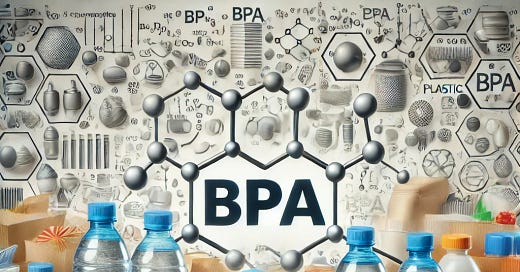BPA and Plastics
TLDR - Plastics are in our food and water and accumulate in our bodies. They disrupt hormonal balance, contribute to inflammation, and cause a danger response in the body.
Plastics Food and Water
Microplastics: These tiny plastic particles are now found in oceans, rivers, and lakes, contaminating our water supply. Microplastics can also be found in the soil, eventually making their way into crops and animals that we consume.
Food Packaging: Many food items are stored in plastic containers or wrapped in plastic film. Over time, chemicals from these plastics can leach into the food, especially when heated or exposed to acidic or fatty substances.
Bottled Water: Studies have shown that bottled water often contains microplastics, likely from the bottling process and the plastic containers themselves.
Impact on Body
Endocrine Disruption: Chemicals like bisphenol A (BPA) and phthalates, commonly found in plastics, mimic hormones and disrupt the endocrine system. This can lead to reproductive issues, developmental problems, and increased cancer risk.
Inflammation: Plastics can trigger chronic inflammation, contributing to a range of health problems, including cardiovascular diseases and autoimmune conditions.
Oxidative Stress: The accumulation of plastics can lead to oxidative stress, damaging cells and tissues, impairing their function.
Microbial Imbalance: Ingested plastics can disrupt the gut microbiome, leading to dysbiosis and associated digestive and immune system problems.
BPAs
BPA is one plastic that has been extensively studied and is well known for its harmful effects. Many other types of plastics, such as bisphenol S (BPS) and bisphenol F (BPF), may also pose similar or even greater health risks but have not been as thoroughly studied. These alternative plastics are often used as substitutes for BPA but can still be harmful. Your mindset shouldn’t be that plastic is safe as long as it’s not BPA. Instead, try to avoid plastic whenever possible, regardless of if it contains BPA or not.
Avoiding Plastics
Choose Alternatives: Use glass or stainless steel instead of plastic for food storage and water bottles.
Avoid Plastic Packaging: Opt for fresh produce and bulk items that are not packaged in plastic. Bring your reusable bags and containers when shopping.
Food Storage: Avoid microwaving food in plastic containers, as heat can increase chemical leaching. Use wax paper or beeswax wraps instead of plastic wrap.
Filter Your Water: Use water filters that are capable of removing microplastics to ensure cleaner drinking water.
Personal Care Products: Choose personal care products that come in non-plastic packaging and avoid products containing microbeads.



